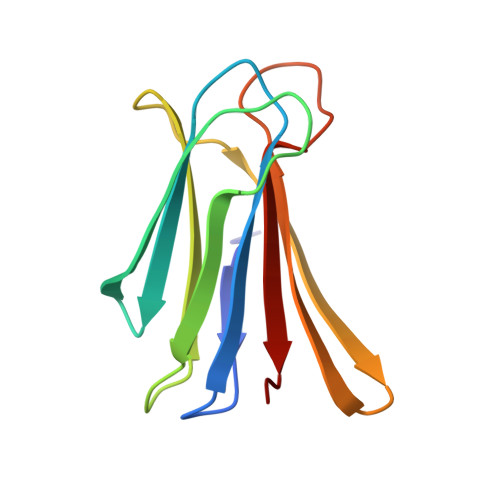Induction of rare conformation of oligosaccharide by binding to calcium-dependent bacterial lectin: X-ray crystallography and modelling study.
Lepsik, M., Sommer, R., Kuhaudomlarp, S., Lelimousin, M., Paci, E., Varrot, A., Titz, A., Imberty, A.(2019) Eur J Med Chem 177: 212-220
- PubMed: 31146126
- DOI: https://doi.org/10.1016/j.ejmech.2019.05.049
- Primary Citation of Related Structures:
5A70, 6R35 - PubMed Abstract:
Pathogenic micro-organisms utilize protein receptors (lectins) in adhesion to host tissues, a process that in some cases relies on the interaction between lectins and human glycoconjugates. Oligosaccharide epitopes are recognized through their three-dimensional structure and their flexibility is a key issue in specificity. In this paper, we analysed by X-ray crystallography the structures of the LecB lectin from two strains of Pseudomonas aeruginosa in complex with Lewis x oligosaccharide present on cell surfaces of human tissues. An unusual conformation of the glycan was observed in all binding sites with a non-canonical syn orientation of the N-acetyl group of N-acetyl-glucosamine. A PDB-wide search revealed that such an orientation occurs only in 4% of protein/carbohydrate complexes. Theoretical chemistry calculations showed that the observed conformation is unstable in solution but stabilised by the lectin. A reliable description of LecB/Lewis x complex by force field-based methods had proven especially challenging due to the special feature of the binding site, two closely apposed Ca 2+ ions which induce strong charge delocalisation. By comparing various force-field parametrisations, we propose a general strategy which will be useful in near future for designing carbohydrate-based ligands (glycodrugs) against other calcium-dependent protein receptors.
- Université Grenoble Alpes, CNRS, CERMAV, 38000, Grenoble, France. Electronic address: martin.lepsik@cermav.cnrs.fr.
Organizational Affiliation:



















